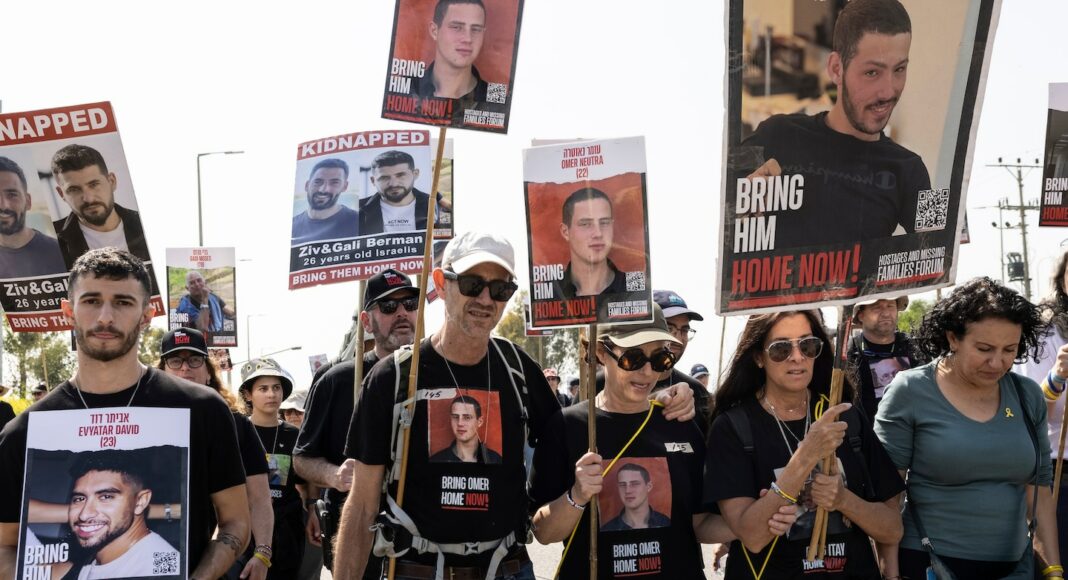After weeks of negotiation, Israeli and Palestinian authorities may be nearing a cease-fire agreement that would allow for the release of hostages in the custody of Hamas — which governs the Gaza Strip — and prisoners detained in Israel. Both sides have accepted the general framework that includes more aid for Gazans, U.S. officials say, but not all of the details. Israel, Hamas and their mediators are trying to make a deal before March 10, the start of the holy month of Ramadan.
Families of Israeli hostages on Feb. 28 set off on a four-day march from the Gaza border to Jerusalem, to call for the release of all hostages. (Video: Reuters)
How long would the cease-fire last?
Vice President Harris said Sunday that the agreement would include an immediate cease-fire to last at least six weeks, the longest pause in fighting since a week-long period that ended in December. The humanitarian pause facilitated hostage-for-prisoner exchanges and aid deliveries. Cease-fires generally last longer than such pauses, The Washington Post reported in November.
White House officials, who spoke on the condition of anonymity under ground rules set by the White House to brief reporters, said Saturday that the framework would include freeing hostages held by Hamas and allowing more aid.
Gazans are enduring a desperate and worsening humanitarian crisis, partly because of Israeli restrictions on aid. Harris and President Biden said recently that Israel should allow more aid into Gaza.
What is the status of negotiations?
Talks involving Egypt, Qatar and the United States were underway Sunday in Cairo, but a deal did not appear to be imminent.
Israel will not send a high-level delegation to Egypt until Hamas responds to questions about the framework, an Israeli official with knowledge of the negotiations told The Post over the weekend, speaking on the condition of anonymity to discuss sensitive talks.
The questions were about the number and identities of Hamas-held hostages and Israeli-detained prisoners who would be swapped, Israeli media reported.
White House officials said a deal was close.
“The framework is there,” a senior administration official said Saturday in a background briefing. “The Israelis have basically signed on to the elements of the arrangement. And right now, the ball is in the court of Hamas.”
On Sunday, Harris said it was up to Hamas to accept the plan.
“Hamas claims it wants a cease-fire,” she said during a speech in Alabama. “Well, there is a deal on the table.”
Details have bedeviled the progress of negotiations since January, The Post reported, and Israeli Prime Minister Benjamin Netanyahu rejected a cease-fire framework in February.
Vice President Harris on March 3 called for an “immediate cease-fire” in Gaza for “at least” six weeks. (Video: The Washington Post)
One of the White House officials said Saturday that “vulnerable hostages” would be available for release in the first phase of the agreement. Defining that group has been a point of contention, but it loosely includes the sick, the wounded, the elderly and women.
The Israeli government as of Tuesday estimated that about 100 hostages remain in Gaza, though it has not given the full basis for its estimates. It is unclear how many prisoners Israel would release in exchange for some hostages. Hamas has said it would release all hostages if Israel withdraws all of its troops. Israel has said it will not stop fighting until it has destroyed Hamas.
At least 30,534 people have been killed and 71,920 injured in Gaza since the war began, according to the Gaza Health Ministry, which does not distinguish between civilians and combatants. Israel estimates that about 1,200 people were killed in Hamas’s Oct. 7 attack and says 246 soldiers have been killed since the start of its military operation in Gaza.
Why do mediators hope to reach a deal before Ramadan?
Ramadan is the holiest period of the Islamic calendar, observed by a month of fasting. From dawn to dusk during Ramadan, adult Muslims abstain from food, drink, smoking and sexual relations.
The holy month, which begins this year at sundown on Sunday, is celebrated by Muslims around the world as a time for religious gatherings and prayer but has historically been a flash point in the Israeli-Palestinian conflict. Last year, Israeli police raided al-Aqsa Mosque in Jerusalem and arrested Palestinian worshipers during Ramadan, prompting a deadly exchange of strikes between Hamas and Israel.



